Intro
Recognize Alcohol Withdrawal Signs, symptoms, and treatment. Identify delirium tremens, seizures, and other related health risks, and learn about managing withdrawal safely and effectively.
Alcohol withdrawal is a serious condition that can occur when an individual who has been drinking heavily for a prolonged period of time suddenly stops or significantly reduces their alcohol consumption. The symptoms of alcohol withdrawal can range from mild to severe and can be life-threatening in some cases. It is essential to recognize the signs of alcohol withdrawal to provide timely and appropriate medical attention. Alcohol withdrawal is a significant public health concern, and understanding its signs and symptoms can help individuals and healthcare professionals to address this issue effectively.
The importance of recognizing alcohol withdrawal signs cannot be overstated. Alcohol withdrawal can lead to serious health complications, including seizures, delirium tremens, and even death. Moreover, alcohol withdrawal can have a significant impact on an individual's quality of life, relationships, and overall well-being. By understanding the signs and symptoms of alcohol withdrawal, individuals can seek help and support to manage their condition and overcome their addiction. Furthermore, recognizing the signs of alcohol withdrawal can help healthcare professionals to provide effective treatment and care to individuals struggling with alcohol addiction.
Alcohol withdrawal is a complex condition that can affect anyone who has been drinking heavily for a prolonged period. The risk of alcohol withdrawal is higher in individuals who have been drinking heavily for many years, as well as those who have a history of alcohol addiction. Additionally, certain factors such as age, sex, and overall health can also increase the risk of alcohol withdrawal. By understanding these risk factors and recognizing the signs of alcohol withdrawal, individuals and healthcare professionals can take proactive steps to prevent and manage this condition.
What is Alcohol Withdrawal?
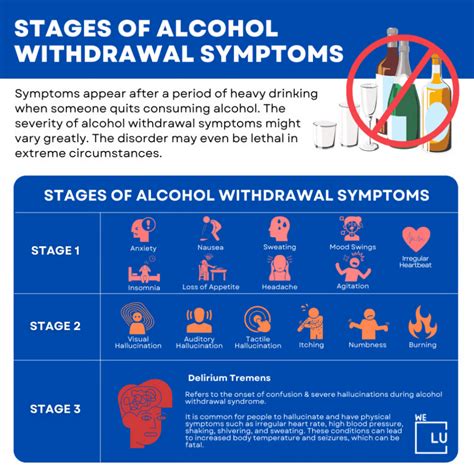
How Does Alcohol Withdrawal Occur?
Alcohol withdrawal occurs when the brain is no longer able to function normally due to the sudden absence of alcohol. The brain relies on a delicate balance of neurotransmitters to function properly, and alcohol disrupts this balance. When an individual drinks heavily, the brain adapts to the constant presence of alcohol by producing more of certain neurotransmitters and less of others. When the individual suddenly stops drinking, the brain is no longer able to produce the right balance of neurotransmitters, leading to a range of symptoms.Signs and Symptoms of Alcohol Withdrawal
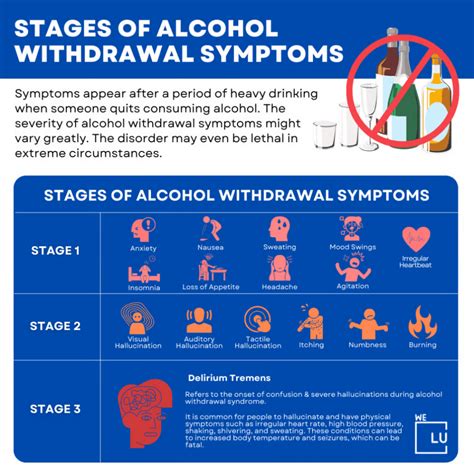
Mild Symptoms of Alcohol Withdrawal
Mild symptoms of alcohol withdrawal can include anxiety, insomnia, and nausea. These symptoms can be uncomfortable but are typically not life-threatening. Mild symptoms of alcohol withdrawal can be managed with supportive care, such as rest, hydration, and over-the-counter medications.Severe Symptoms of Alcohol Withdrawal
Severe symptoms of alcohol withdrawal can include seizures, delirium tremens, and hallucinations. These symptoms can be life-threatening and require immediate medical attention. Severe symptoms of alcohol withdrawal can be managed with medications, such as benzodiazepines, and supportive care, such as hospitalization and monitoring.Treatment Options for Alcohol Withdrawal
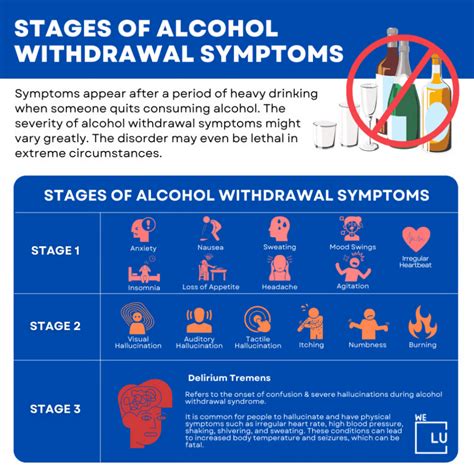
Medications for Alcohol Withdrawal
Medications, such as benzodiazepines, can be used to manage symptoms of alcohol withdrawal. Benzodiazepines can help to reduce anxiety, insomnia, and seizures, and can also help to prevent delirium tremens. Other medications, such as anti-seizure medications, can also be used to manage symptoms of alcohol withdrawal.Supportive Care for Alcohol Withdrawal
Supportive care, such as hospitalization and monitoring, can be used to manage symptoms of alcohol withdrawal. Hospitalization can provide a safe and supportive environment for individuals to manage their symptoms, and monitoring can help to prevent complications. Supportive care can also include counseling, therapy, and support groups to help individuals in their recovery.Preventing Alcohol Withdrawal
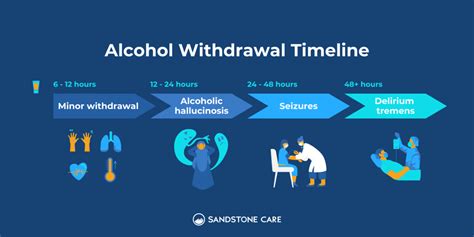
Reducing Alcohol Consumption
Reducing alcohol consumption can help to prevent alcohol withdrawal. This can involve setting goals, such as reducing the amount of alcohol consumed per day, and seeking support from healthcare professionals and counselors. Reducing alcohol consumption can also involve avoiding triggers, such as social situations where alcohol is present, and finding alternative activities, such as exercise or hobbies.Seeking Support
Seeking support from healthcare professionals, counselors, and support groups can help to prevent alcohol withdrawal. Support groups, such as Alcoholics Anonymous, can provide a safe and supportive environment for individuals to share their experiences and receive support. Healthcare professionals can provide guidance, counseling, and medications to help manage symptoms and prevent complications.Conclusion and Final Thoughts
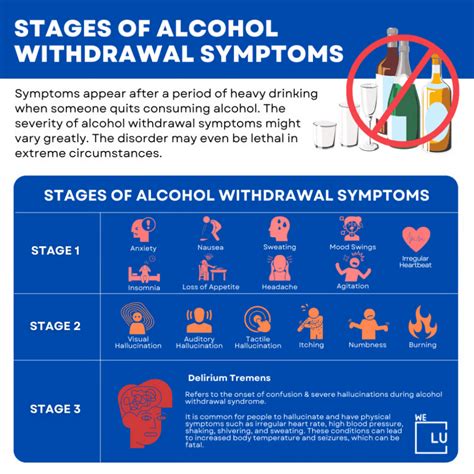
We invite you to share your thoughts and experiences with alcohol withdrawal in the comments section below. If you or someone you know is struggling with alcohol addiction, please seek help and support from healthcare professionals and support groups. You can also share this article with others to help raise awareness about the importance of recognizing and managing alcohol withdrawal.
What are the signs and symptoms of alcohol withdrawal?
+The signs and symptoms of alcohol withdrawal can include anxiety, insomnia, nausea, headaches, fatigue, seizures, and delirium tremens.
How is alcohol withdrawal treated?
+Alcohol withdrawal is treated with medications, such as benzodiazepines, and supportive care, such as hospitalization and monitoring.
Can alcohol withdrawal be prevented?
+Yes, alcohol withdrawal can be prevented by reducing or stopping alcohol consumption gradually and seeking support from healthcare professionals, counselors, and support groups.
What are the risks of alcohol withdrawal?
+The risks of alcohol withdrawal can include seizures, delirium tremens, and even death.
Where can I find help and support for alcohol withdrawal?
+You can find help and support for alcohol withdrawal from healthcare professionals, counselors, and support groups, such as Alcoholics Anonymous.
